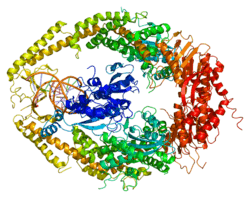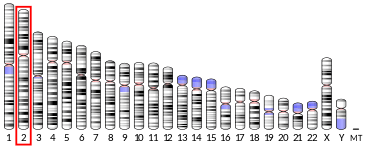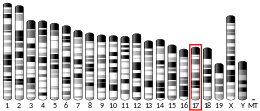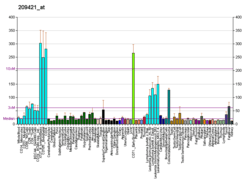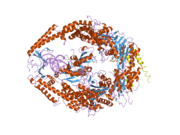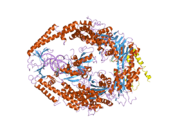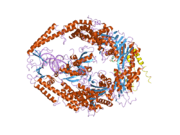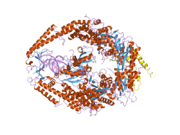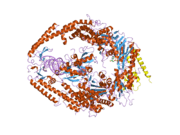MSH2
DNA mismatch repair protein Msh2 also known as MutS homolog 2 or MSH2 is a protein that in humans is encoded by the MSH2 gene, which is located on chromosome 2. MSH2 is a tumor suppressor gene and more specifically a caretaker gene that codes for a DNA mismatch repair (MMR) protein, MSH2, which forms a heterodimer with MSH6 to make the human MutSα mismatch repair complex. It also dimerizes with MSH3 to form the MutSβ DNA repair complex. MSH2 is involved in many different forms of DNA repair, including transcription-coupled repair,[5] homologous recombination,[6] and base excision repair.[7]
Mutations in the MSH2 gene are associated with microsatellite instability and some cancers, especially with hereditary nonpolyposis colorectal cancer (HNPCC).
Clinical significance
Hereditary nonpolyposis colorectal cancer (HNPCC), sometimes referred to as Lynch syndrome, is inherited in an autosomal dominant fashion, where inheritance of only one copy of a mutated mismatch repair gene is enough to cause disease phenotype. Mutations in the MSH2 gene account for 40% of genetic alterations associated with this disease and is the leading cause, together with MLH1 mutations.[8] Mutations associated with HNPCC are broadly distributed in all domains of MSH2, and hypothetical functions of these mutations based on the crystal structure of the MutSα include protein–protein interactions, stability, allosteric regulation, MSH2-MSH6 interface, and DNA binding.[9] Mutations in MSH2 and other mismatch repair genes cause DNA damage to go unrepaired, resulting in an increase in mutation frequency. These mutations build up over a person's life that otherwise would not have occurred had the DNA been repaired properly.
Microsatellite instability
The viability of MMR genes including MSH2 can be tracked via microsatellite instability, a biomarker test that analyzes short sequence repeats which are very difficult for cells to replicate without a functioning mismatch repair system. Because these sequences vary in the population, the actual number of copies of short sequence repeats does not matter, just that the number the patient does have is consistent from tissue to tissue and over time. This phenomenon occurs because these sequences are prone to mistakes by the DNA replication complex, which then need to be fixed by the mismatch repair genes. If these are not working, over time either duplications or deletions of these sequences will occur, leading to different numbers of repeats in the same patient.
71% of HNPCC patients show microsatellite instability.[10] Detection methods for microsatellite instability include polymerase chain reaction (PCR) and immunohistochemical (IHC) methods, polymerase chain checking the DNA and immunohistochemical surveying mismatch repair protein levels. "Currently, there are evidences that universal testing for MSI starting with either IHC or PCR-based MSI testing is cost effective, sensitive, specific and is generally widely accepted."[11]
Role in mismatch repair
In eukaryotes from yeast to humans, MSH2 dimerizes with MSH6 to form the MutSα complex,[12] which is involved in base mismatch repair and short insertion/deletion loops.[13] MSH2 heterodimerization stabilizes MSH6, which is not stable because of its N-terminal disordered domain. Conversely, MSH2 does not have a nuclear localization sequence (NLS), so it is believed that MSH2 and MSH6 dimerize in the cytoplasm and then are imported into the nucleus together.[14] In the MutSα dimer, MSH6 interacts with the DNA for mismatch recognition while MSH2 provides the stability that MSH6 requires. MSH2 can be imported into the nucleus without dimerizing to MSH6, in this case, MSH2 is probably dimerized to MSH3 to form MutSβ.[15] MSH2 has two interacting domains with MSH6 in the MutSα heterodimer, a DNA interacting domain, and an ATPase domain.[16]
The MutSα dimer scans double stranded DNA in the nucleus, looking for mismatched bases. When the complex finds one, it repairs the mutation in an ATP dependent manner. The MSH2 domain of MutSα prefers ADP to ATP, with the MSH6 domain preferring the opposite. Studies have indicated that MutSα only scans DNA with the MSH2 domain harboring ADP, while the MSH6 domain can contain either ADP or ATP.[17] MutSα then associates with MLH1 to repair the damaged DNA.
MutSβ is formed when MSH2 complexes with MSH3 instead of MSH6. This dimer repairs longer insertion/deletion loops than MutSα.[18] Because of the nature of the mutations that this complex repairs, this is probably the state of MSH2 that causes the microsatellite instability phenotype. Large DNA insertions and deletions intrinsically bend the DNA double helix. The MSH2/MSH3 dimer can recognize this topology and initiate repair. The mechanism by which it recognizes mutations is different as well, because it separates the two DNA strands, which MutSα does not.[19]
Interactions
MSH2 has been shown to interact with:
Epigenetic MSH2 deficiencies in cancer
DNA damage appears to be the primary underlying cause of cancer,[32] and deficiencies in expression of DNA repair genes appear to underlie many forms of cancer.[33][34] If DNA repair is deficient, DNA damage tends to accumulate. Such excess DNA damage may increase mutations due to error-prone translesion synthesis and error prone repair (see e.g. microhomology-mediated end joining). Elevated DNA damage may also increase epigenetic alterations due to errors during DNA repair.[35][36] Such mutations and epigenetic alterations may give rise to cancer.
Reductions in expression of DNA repair genes (usually caused by epigenetic alterations) are very common in cancers, and are ordinarily much more frequent than mutational defects in DNA repair genes in cancers. (See Frequencies of epimutations in DNA repair genes.) In a study of MSH2 in non-small cell lung cancer (NSCLC), no mutations were found while 29% of NSCLC had epigenetic reduction of MSH2 expression.[37] In acute lymphoblastoid leukemia (ALL), no MSH2 mutations were found[38] while 43% of ALL patients showed MSH2 promoter methylation and 86% of relapsed ALL patients had MSH2 promoter methylation.[39] There were, however, mutations in four other genes in ALL patients that destabilized the MSH2 protein, and these were defective in 11% of children with ALL and 16% of adults with this cancer.[38]
Methylation of the promoter region of the MSH2 gene is correlated with the lack of expression of the MSH2 protein in esophageal cancer,[40] in non-small-cell lung cancer,[37][41] and in colorectal cancer.[42] These correlations suggest that methylation of the promoter region of the MSH2 gene reduces expression of the MSH2 protein. Such promoter methylation would reduce DNA repair in the four pathways in which MSH2 participates: DNA mismatch repair, transcription-coupled repair[5] homologous recombination,[6][43][44] and base excision repair.[7] Such reductions in repair likely allow excess DNA damage to accumulate and contribute to carcinogenesis.
The frequencies of MSH2 promoter methylation in several different cancers are indicated in the Table.
| Cancer | Frequency of MSH2 promoter methylation | Ref. |
|---|---|---|
| Acute lymphoblastic leukemia | 43% | [39] |
| Relapsed Acute lymphoblastic leukemia | 86% | [39] |
| Renal cell carcinoma | 51–55% | [45][46] |
| Esophageal squamous cell carcinoma | 29–48% | [40][47] |
| Head and neck squamous-cell carcinoma | 27–36% | [48][49][50] |
| Non-small cell lung cancer | 29–34% | [37][41] |
| Hepatocellular carcinoma | 10–29% | [51] |
| Colorectal cancer | 3–24% | [42][52][53][54] |
| Soft-tissue sarcoma | 8% | [55] |
See also
- Mismatch repair#MutS
References
- GRCh38: Ensembl release 89: ENSG00000095002 - Ensembl, May 2017
- GRCm38: Ensembl release 89: ENSMUSG00000024151 - Ensembl, May 2017
- "Human PubMed Reference:". National Center for Biotechnology Information, U.S. National Library of Medicine.
- "Mouse PubMed Reference:". National Center for Biotechnology Information, U.S. National Library of Medicine.
- Mellon I, Rajpal DK, Koi M, Boland CR, Champe GN (April 1996). "Transcription-coupled repair deficiency and mutations in human mismatch repair genes". Science. 272 (5261): 557–60. doi:10.1126/science.272.5261.557. PMID 8614807.
- de Wind N, Dekker M, Berns A, Radman M, te Riele H (July 1995). "Inactivation of the mouse Msh2 gene results in mismatch repair deficiency, methylation tolerance, hyperrecombination, and predisposition to cancer". Cell. 82 (2): 321–30. doi:10.1016/0092-8674(95)90319-4. PMID 7628020.
- Pitsikas P, Lee D, Rainbow AJ (May 2007). "Reduced host cell reactivation of oxidative DNA damage in human cells deficient in the mismatch repair gene hMSH2". Mutagenesis. 22 (3): 235–43. doi:10.1093/mutage/gem008. PMID 17351251.
- Müller A, Fishel R (2002). "Mismatch repair and the hereditary non-polyposis colorectal cancer syndrome (HNPCC)". Cancer Invest. 20 (1): 102–9. doi:10.1081/cnv-120000371. PMID 11852992.
- Warren JJ, Pohlhaus TJ, Changela A, Iyer RR, Modrich PL, Beese LS (May 2007). "Structure of the human MutSalpha DNA lesion recognition complex". Mol. Cell. 26 (4): 579–92. doi:10.1016/j.molcel.2007.04.018. PMID 17531815.
- Bonis PA, Trikalinos TA, Chung M, Chew P, Ip S, DeVine DA, Lau J (May 2007). "Hereditary nonpolyposis colorectal cancer: diagnostic strategies and their implications". Evid Rep Technol Assess (Full Rep) (150): 1–180. PMC 4781224. PMID 17764220.
- Zhang X, Li J (February 2013). "Era of universal testing of microsatellite instability in colorectal cancer". World J Gastrointest Oncol. 5 (2): 12–9. doi:10.4251/wjgo.v5.i2.12. PMC 3613766. PMID 23556052.
- Hargreaves VV, Shell SS, Mazur DJ, Hess MT, Kolodner RD (March 2010). "Interaction between the Msh2 and Msh6 nucleotide-binding sites in the Saccharomyces cerevisiae Msh2-Msh6 complex". J. Biol. Chem. 285 (12): 9301–10. doi:10.1074/jbc.M109.096388. PMC 2838348. PMID 20089866.
- Drummond JT, Li GM, Longley MJ, Modrich P (June 1995). "Isolation of an hMSH2-p160 heterodimer that restores DNA mismatch repair to tumor cells". Science. 268 (5219): 1909–12. doi:10.1126/science.7604264. PMID 7604264.
- Christmann M, Kaina B (November 2000). "Nuclear translocation of mismatch repair proteins MSH2 and MSH6 as a response of cells to alkylating agents". J. Biol. Chem. 275 (46): 36256–62. doi:10.1074/jbc.M005377200. PMID 10954713.
- Edelbrock MA, Kaliyaperumal S, Williams KJ (February 2013). "Structural, molecular and cellular functions of MSH2 and MSH6 during DNA mismatch repair, damage signaling and other noncanonical activities". Mutat. Res. 743–744: 53–66. doi:10.1016/j.mrfmmm.2012.12.008. PMC 3659183. PMID 23391514.
- Guerrette S, Wilson T, Gradia S, Fishel R (November 1998). "Interactions of human hMSH2 with hMSH3 and hMSH2 with hMSH6: examination of mutations found in hereditary nonpolyposis colorectal cancer". Mol. Cell. Biol. 18 (11): 6616–23. doi:10.1128/mcb.18.11.6616. PMC 109246. PMID 9774676.
- Qiu R, DeRocco VC, Harris C, Sharma A, Hingorani MM, Erie DA, Weninger KR (May 2012). "Large conformational changes in MutS during DNA scanning, mismatch recognition and repair signalling". EMBO J. 31 (11): 2528–40. doi:10.1038/emboj.2012.95. PMC 3365432. PMID 22505031.
- Dowen JM, Putnam CD, Kolodner RD (July 2010). "Functional studies and homology modeling of Msh2-Msh3 predict that mispair recognition involves DNA bending and strand separation". Mol. Cell. Biol. 30 (13): 3321–8. doi:10.1128/MCB.01558-09. PMC 2897569. PMID 20421420.
- Gupta S, Gellert M, Yang W (January 2012). "Mechanism of mismatch recognition revealed by human MutSβ bound to unpaired DNA loops". Nat. Struct. Mol. Biol. 19 (1): 72–8. doi:10.1038/nsmb.2175. PMC 3252464. PMID 22179786.
- Wang Y, Qin J (December 2003). "MSH2 and ATR form a signaling module and regulate two branches of the damage response to DNA methylation". Proc. Natl. Acad. Sci. U.S.A. 100 (26): 15387–92. doi:10.1073/pnas.2536810100. PMC 307577. PMID 14657349.
- Wang Q, Zhang H, Guerrette S, Chen J, Mazurek A, Wilson T, Slupianek A, Skorski T, Fishel R, Greene MI (August 2001). "Adenosine nucleotide modulates the physical interaction between hMSH2 and BRCA1". Oncogene. 20 (34): 4640–9. doi:10.1038/sj.onc.1204625. PMID 11498787.
- Wang Y, Cortez D, Yazdi P, Neff N, Elledge SJ, Qin J (April 2000). "BASC, a super complex of BRCA1-associated proteins involved in the recognition and repair of aberrant DNA structures". Genes Dev. 14 (8): 927–39. doi:10.1101/gad.14.8.927. PMC 316544. PMID 10783165.
- Adamson AW, Beardsley DI, Kim WJ, Gao Y, Baskaran R, Brown KD (March 2005). "Methylator-induced, mismatch repair-dependent G2 arrest is activated through Chk1 and Chk2". Mol. Biol. Cell. 16 (3): 1513–26. doi:10.1091/mbc.E04-02-0089. PMC 551512. PMID 15647386.
- Brown KD, Rathi A, Kamath R, Beardsley DI, Zhan Q, Mannino JL, Baskaran R (January 2003). "The mismatch repair system is required for S-phase checkpoint activation". Nat. Genet. 33 (1): 80–4. doi:10.1038/ng1052. PMID 12447371.
- Rasmussen LJ, Rasmussen M, Lee B, Rasmussen AK, Wilson DM, Nielsen FC, Bisgaard HC (June 2000). "Identification of factors interacting with hMSH2 in the fetal liver utilizing the yeast two-hybrid system. In vivo interaction through the C-terminal domains of hEXO1 and hMSH2 and comparative expression analysis". Mutat. Res. 460 (1): 41–52. doi:10.1016/S0921-8777(00)00012-4. PMID 10856833.
- Schmutte C, Marinescu RC, Sadoff MM, Guerrette S, Overhauser J, Fishel R (October 1998). "Human exonuclease I interacts with the mismatch repair protein hMSH2". Cancer Res. 58 (20): 4537–42. PMID 9788596.
- Schmutte C, Sadoff MM, Shim KS, Acharya S, Fishel R (August 2001). "The interaction of DNA mismatch repair proteins with human exonuclease I". J. Biol. Chem. 276 (35): 33011–8. doi:10.1074/jbc.M102670200. PMID 11427529.
- Mac Partlin M, Homer E, Robinson H, McCormick CJ, Crouch DH, Durant ST, Matheson EC, Hall AG, Gillespie DA, Brown R (February 2003). "Interactions of the DNA mismatch repair proteins MLH1 and MSH2 with c-MYC and MAX". Oncogene. 22 (6): 819–25. doi:10.1038/sj.onc.1206252. PMID 12584560.
- Bocker T, Barusevicius A, Snowden T, Rasio D, Guerrette S, Robbins D, Schmidt C, Burczak J, Croce CM, Copeland T, Kovatich AJ, Fishel R (February 1999). "hMSH5: a human MutS homologue that forms a novel heterodimer with hMSH4 and is expressed during spermatogenesis". Cancer Res. 59 (4): 816–22. PMID 10029069.
- Acharya S, Wilson T, Gradia S, Kane MF, Guerrette S, Marsischky GT, Kolodner R, Fishel R (November 1996). "hMSH2 forms specific mispair-binding complexes with hMSH3 and hMSH6". Proc. Natl. Acad. Sci. U.S.A. 93 (24): 13629–34. doi:10.1073/pnas.93.24.13629. PMC 19374. PMID 8942985.
- Scherer SJ, Welter C, Zang KD, Dooley S (April 1996). "Specific in vitro binding of p53 to the promoter region of the human mismatch repair gene hMSH2". Biochem. Biophys. Res. Commun. 221 (3): 722–8. doi:10.1006/bbrc.1996.0663. PMID 8630028.
- Kastan MB (April 2008). "DNA damage responses: mechanisms and roles in human disease: 2007 G.H.A. Clowes Memorial Award Lecture". Molecular Cancer Research. 6 (4): 517–24. doi:10.1158/1541-7786.MCR-08-0020. PMID 18403632.
- Harper JW, Elledge SJ (December 2007). "The DNA damage response: ten years after". Molecular Cell. 28 (5): 739–45. doi:10.1016/j.molcel.2007.11.015. PMID 18082599.
- Dietlein F, Reinhardt HC (December 2014). "Molecular pathways: exploiting tumor-specific molecular defects in DNA repair pathways for precision cancer therapy". Clinical Cancer Research. 20 (23): 5882–7. doi:10.1158/1078-0432.CCR-14-1165. PMID 25451105.
- O'Hagan HM, Mohammad HP, Baylin SB (2008). "Double strand breaks can initiate gene silencing and SIRT1-dependent onset of DNA methylation in an exogenous promoter CpG island". PLoS Genetics. 4 (8): e1000155. doi:10.1371/journal.pgen.1000155. PMC 2491723. PMID 18704159.
- Cuozzo C, Porcellini A, Angrisano T, Morano A, Lee B, Di Pardo A, Messina S, Iuliano R, Fusco A, Santillo MR, Muller MT, Chiariotti L, Gottesman ME, Avvedimento EV (July 2007). "DNA damage, homology-directed repair, and DNA methylation". PLoS Genetics. 3 (7): e110. doi:10.1371/journal.pgen.0030110. PMC 1913100. PMID 17616978.
- Wang YC, Lu YP, Tseng RC, Lin RK, Chang JW, Chen JT, Shih CM, Chen CY (2003). "Inactivation of hMLH1 and hMSH2 by promoter methylation in primary non-small cell lung tumors and matched sputum samples". J. Clin. Invest. 111 (6): 887–95. doi:10.1172/JCI15475. PMC 153761. PMID 12639995.
- Diouf B, Cheng Q, Krynetskaia NF, Yang W, Cheok M, Pei D, Fan Y, Cheng C, Krynetskiy EY, Geng H, Chen S, Thierfelder WE, Mullighan CG, Downing JR, Hsieh P, Pui CH, Relling MV, Evans WE (2011). "Somatic deletions of genes regulating MSH2 protein stability cause DNA mismatch repair deficiency and drug resistance in human leukemia cells". Nat. Med. 17 (10): 1298–303. doi:10.1038/nm.2430. PMC 3192247. PMID 21946537.
- Wang CX, Wang X, Liu HB, Zhou ZH (2014). "Aberrant DNA methylation and epigenetic inactivation of hMSH2 decrease overall survival of acute lymphoblastic leukemia patients via modulating cell cycle and apoptosis". Asian Pac. J. Cancer Prev. 15 (1): 355–62. doi:10.7314/apjcp.2014.15.1.355. PMID 24528056.
- Ling ZQ, Li P, Ge MH, Hu FJ, Fang XH, Dong ZM, Mao WM (2011). "Aberrant methylation of different DNA repair genes demonstrates distinct prognostic value for esophageal cancer". Dig. Dis. Sci. 56 (10): 2992–3004. doi:10.1007/s10620-011-1774-z. PMID 21674174.
- Hsu HS, Wen CK, Tang YA, Lin RK, Li WY, Hsu WH, Wang YC (2005). "Promoter hypermethylation is the predominant mechanism in hMLH1 and hMSH2 deregulation and is a poor prognostic factor in nonsmoking lung cancer". Clin. Cancer Res. 11 (15): 5410–6. doi:10.1158/1078-0432.CCR-05-0601. PMID 16061855.
- Lee KH, Lee JS, Nam JH, Choi C, Lee MC, Park CS, Juhng SW, Lee JH (2011). "Promoter methylation status of hMLH1, hMSH2, and MGMT genes in colorectal cancer associated with adenoma-carcinoma sequence". Langenbecks Arch Surg. 396 (7): 1017–26. doi:10.1007/s00423-011-0812-9. PMID 21706233.
- Villemure JF, Abaji C, Cousineau I, Belmaaza A (2003). "MSH2-deficient human cells exhibit a defect in the accurate termination of homology-directed repair of DNA double-strand breaks". Cancer Res. 63 (12): 3334–9. PMID 12810667.
- Elliott B, Jasin M (2001). "Repair of double-strand breaks by homologous recombination in mismatch repair-defective mammalian cells". Mol. Cell. Biol. 21 (8): 2671–82. doi:10.1128/MCB.21.8.2671-2682.2001. PMC 86898. PMID 11283247.
- Stoehr C, Burger M, Stoehr R, Bertz S, Ruemmele P, Hofstaedter F, Denzinger S, Wieland WF, Hartmann A, Walter B (2012). "Mismatch repair proteins hMLH1 and hMSH2 are differently expressed in the three main subtypes of sporadic renal cell carcinoma" (PDF). Pathobiology. 79 (3): 162–8. doi:10.1159/000335642. PMID 22378480.
- Yoo KH, Won KY, Lim SJ, Park YK, Chang SG (2014). "Deficiency of MSH2 expression is associated with clear cell renal cell carcinoma". Oncol Lett. 8 (5): 2135–2139. doi:10.3892/ol.2014.2482. PMC 4186615. PMID 25295100.
- Ling ZQ, Zhao Q, Zhou SL, Mao WM (2012). "MSH2 promoter hypermethylation in circulating tumor DNA is a valuable predictor of disease-free survival for patients with esophageal squamous cell carcinoma". Eur J Surg Oncol. 38 (4): 326–32. doi:10.1016/j.ejso.2012.01.008. PMID 22265839.
- Sengupta S, Chakrabarti S, Roy A, Panda CK, Roychoudhury S (2007). "Inactivation of human mutL homolog 1 and mutS homolog 2 genes in head and neck squamous cell carcinoma tumors and leukoplakia samples by promoter hypermethylation and its relation with microsatellite instability phenotype". Cancer. 109 (4): 703–12. doi:10.1002/cncr.22430. PMID 17219447.
- Demokan S, Suoglu Y, Demir D, Gozeler M, Dalay N (2006). "Microsatellite instability and methylation of the DNA mismatch repair genes in head and neck cancer". Ann. Oncol. 17 (6): 995–9. doi:10.1093/annonc/mdl048. PMID 16569647.
- Czerninski R, Krichevsky S, Ashhab Y, Gazit D, Patel V, Ben-Yehuda D (2009). "Promoter hypermethylation of mismatch repair genes, hMLH1 and hMSH2 in oral squamous cell carcinoma". Oral Dis. 15 (3): 206–13. doi:10.1111/j.1601-0825.2008.01510.x. PMID 19207881.
- Hinrichsen I, Kemp M, Peveling-Oberhag J, Passmann S, Plotz G, Zeuzem S, Brieger A (2014). "Promoter methylation of MLH1, PMS2, MSH2 and p16 is a phenomenon of advanced-stage HCCs". PLoS ONE. 9 (1): e84453. doi:10.1371/journal.pone.0084453. PMC 3882222. PMID 24400091.
- Vlaykova T, Mitkova A, Stancheva G, Kadiyska T, Gulubova M, Yovchev Y, Cirovski G, Chilingirov P, Damyanov D, Kremensky I, Mitev V, Kaneva R (2011). "Microsatellite instability and promoter hypermethylation of MLH1 and MSH2 in patients with sporadic colorectal cancer". J BUON. 16 (2): 265–73. PMID 21766496.
- Malhotra P, Anwar M, Kochhar R, Ahmad S, Vaiphei K, Mahmood S (2014). "Promoter methylation and immunohistochemical expression of hMLH1 and hMSH2 in sporadic colorectal cancer: a study from India". Tumour Biol. 35 (4): 3679–87. doi:10.1007/s13277-013-1487-3. PMID 24317816.
- Onrat S, Ceken I, Ellidokuz E, Kupelioğlu A (2011). "Alterations of copy number of methylation pattern in mismatch repair genes by methylation specific-multiplex ligation-dependent probe amplification in cases of colon cancer". Balkan J. Med. Genet. 14 (2): 25–34. doi:10.2478/v10034-011-0044-x. PMC 3776700. PMID 24052709.
- Kawaguchi K, Oda Y, Saito T, Yamamoto H, Takahira T, Kobayashi C, Tamiya S, Tateishi N, Iwamoto Y, Tsuneyoshi M (2006). "DNA hypermethylation status of multiple genes in soft tissue sarcomas". Mod. Pathol. 19 (1): 106–14. doi:10.1038/modpathol.3800502. PMID 16258501.
Further reading
- Jiricny J (1994). "Colon cancer and DNA repair: have mismatches met their match?". Trends Genet. 10 (5): 164–8. doi:10.1016/0168-9525(94)90093-0. PMID 8036718.
- Fishel R, Wilson T (1997). "MutS homologs in mammalian cells". Curr. Opin. Genet. Dev. 7 (1): 105–13. doi:10.1016/S0959-437X(97)80117-7. PMID 9024626.
- Lothe RA (1997). "Microsatellite instability in human solid tumors". Molecular Medicine Today. 3 (2): 61–8. doi:10.1016/S1357-4310(96)10055-1. PMID 9060003.
- Peltomäki P, de la Chapelle A (1997). "Mutations predisposing to hereditary nonpolyposis colorectal cancer". Adv. Cancer Res. 71: 93–119. doi:10.1016/S0065-230X(08)60097-4. PMID 9111864.
- Papadopoulos N, Lindblom A (1997). "Molecular basis of HNPCC: mutations of MMR genes". Hum. Mutat. 10 (2): 89–99. doi:10.1002/(SICI)1098-1004(1997)10:2<89::AID-HUMU1>3.0.CO;2-H. PMID 9259192.
- Kauh J, Umbreit J (2004). "Colorectal cancer prevention". Current Problems in Cancer. 28 (5): 240–64. doi:10.1016/j.currproblcancer.2004.05.004. PMID 15375803.
- Warusavitarne J, Schnitzler M (2007). "The role of chemotherapy in microsatellite unstable (MSI-H) colorectal cancer". International journal of colorectal disease. 22 (7): 739–48. doi:10.1007/s00384-006-0228-0. PMID 17109103.
- Wei Q, Xu X, Cheng L, et al. (1995). "Simultaneous amplification of four DNA repair genes and beta-actin in human lymphocytes by multiplex reverse transcriptase-PCR". Cancer Res. 55 (21): 5025–9. PMID 7585546.
- Wilson TM, Ewel A, Duguid JR, et al. (1995). "Differential cellular expression of the human MSH2 repair enzyme in small and large intestine". Cancer Res. 55 (22): 5146–50. PMID 7585562.
- Drummond JT, Li GM, Longley MJ, Modrich P (1995). "Isolation of an hMSH2-p160 heterodimer that restores DNA mismatch repair to tumor cells". Science. 268 (5219): 1909–12. doi:10.1126/science.7604264. PMID 7604264.
- Kolodner RD, Hall NR, Lipford J, et al. (1995). "Structure of the human MSH2 locus and analysis of two Muir-Torre kindreds for msh2 mutations". Genomics. 24 (3): 516–26. doi:10.1006/geno.1994.1661. PMID 7713503.
- Wijnen J, Vasen H, Khan PM, et al. (1995). "Seven new mutations in hMSH2, an HNPCC gene, identified by denaturing gradient-gel electrophoresis". Am. J. Hum. Genet. 56 (5): 1060–6. PMC 1801472. PMID 7726159.
- Mary JL, Bishop T, Kolodner R, et al. (1995). "Mutational analysis of the hMSH2 gene reveals a three base pair deletion in a family predisposed to colorectal cancer development". Hum. Mol. Genet. 3 (11): 2067–9. PMID 7874129.
- Fishel R, Ewel A, Lescoe MK (1994). "Purified human MSH2 protein binds to DNA containing mismatched nucleotides". Cancer Res. 54 (21): 5539–42. PMID 7923193.
- Fishel R, Ewel A, Lee S, et al. (1994). "Binding of mismatched microsatellite DNA sequences by the human MSH2 protein". Science. 266 (5189): 1403–5. doi:10.1126/science.7973733. PMID 7973733.
- Liu B, Parsons RE, Hamilton SR, et al. (1994). "hMSH2 mutations in hereditary nonpolyposis colorectal cancer kindreds". Cancer Res. 54 (17): 4590–4. PMID 8062247.
- Maruyama K, Sugano S (1994). "Oligo-capping: a simple method to replace the cap structure of eukaryotic mRNAs with oligoribonucleotides". Gene. 138 (1–2): 171–4. doi:10.1016/0378-1119(94)90802-8. PMID 8125298.
- Fishel R, Lescoe MK, Rao MR, et al. (1994). "The human mutator gene homolog MSH2 and its association with hereditary nonpolyposis colon cancer". Cell. 77 (1): 167–169. doi:10.1016/0092-8674(94)90306-9. PMID 8156592.
- Fishel R, Lescoe MK, Rao MR, et al. (1994). "The human mutator gene homolog MSH2 and its association with hereditary nonpolyposis colon cancer". Cell. 75 (5): 1027–38. doi:10.1016/0092-8674(93)90546-3. PMID 8252616.
External links
- MutS+Homolog+2+Protein at the US National Library of Medicine Medical Subject Headings (MeSH)
